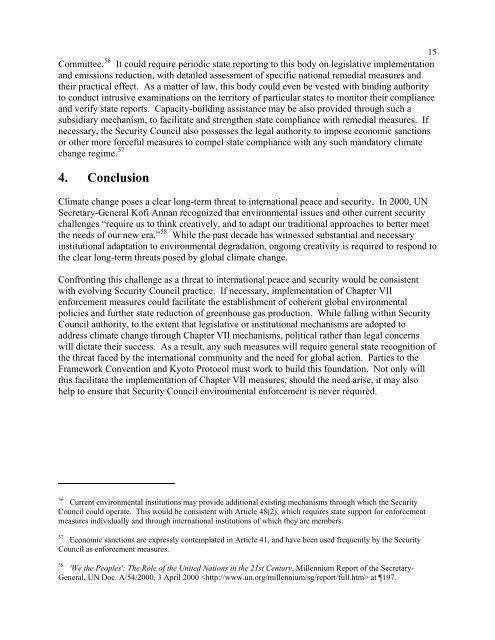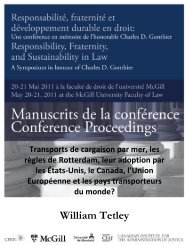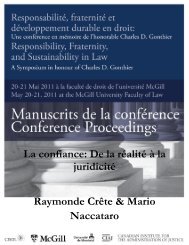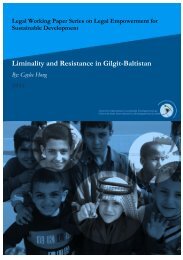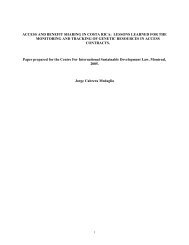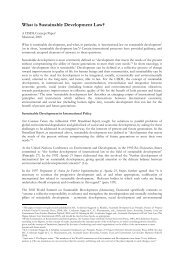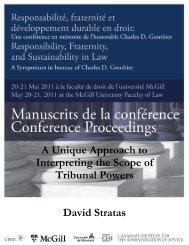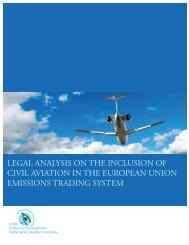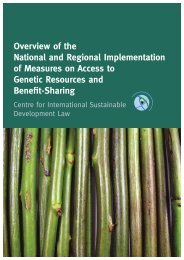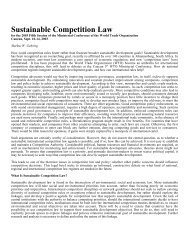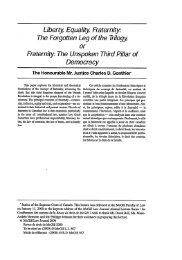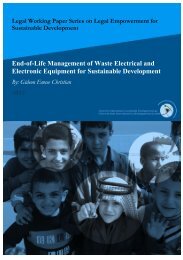Climate Change and the Security Council - CISDL
Climate Change and the Security Council - CISDL
Climate Change and the Security Council - CISDL
Create successful ePaper yourself
Turn your PDF publications into a flip-book with our unique Google optimized e-Paper software.
15<br />
Committee. 56 It could require periodic state reporting to this body on legislative implementation<br />
<strong>and</strong> emissions reduction, with detailed assessment of specific national remedial measures <strong>and</strong><br />
<strong>the</strong>ir practical effect. As a matter of law, this body could even be vested with binding authority<br />
to conduct intrusive examinations on <strong>the</strong> territory of particular states to monitor <strong>the</strong>ir compliance<br />
<strong>and</strong> verify state reports. Capacity-building assistance may be also provided through such a<br />
subsidiary mechanism, to facilitate <strong>and</strong> streng<strong>the</strong>n state compliance with remedial measures. If<br />
necessary, <strong>the</strong> <strong>Security</strong> <strong>Council</strong> also possesses <strong>the</strong> legal authority to impose economic sanctions<br />
or o<strong>the</strong>r more forceful measures to compel state compliance with any such m<strong>and</strong>atory climate<br />
change regime. 57<br />
4. Conclusion<br />
<strong>Climate</strong> change poses a clear long-term threat to international peace <strong>and</strong> security. In 2000, UN<br />
Secretary-General Kofi Annan recognized that environmental issues <strong>and</strong> o<strong>the</strong>r current security<br />
challenges “require us to think creatively, <strong>and</strong> to adapt our traditional approaches to better meet<br />
<strong>the</strong> needs of our new era.” 58 While <strong>the</strong> past decade has witnessed substantial <strong>and</strong> necessary<br />
institutional adaptation to environmental degradation, ongoing creativity is required to respond to<br />
<strong>the</strong> clear long-term threats posed by global climate change.<br />
Confronting this challenge as a threat to international peace <strong>and</strong> security would be consistent<br />
with evolving <strong>Security</strong> <strong>Council</strong> practice. If necessary, implementation of Chapter VII<br />
enforcement measures could facilitate <strong>the</strong> establishment of coherent global environmental<br />
policies <strong>and</strong> fur<strong>the</strong>r state reduction of greenhouse gas production. While falling within <strong>Security</strong><br />
<strong>Council</strong> authority, to <strong>the</strong> extent that legislative or institutional mechanisms are adopted to<br />
address climate change through Chapter VII mechanisms, political ra<strong>the</strong>r than legal concerns<br />
will dictate <strong>the</strong>ir success. As a result, any such measures will require general state recognition of<br />
<strong>the</strong> threat faced by <strong>the</strong> international community <strong>and</strong> <strong>the</strong> need for global action. Parties to <strong>the</strong><br />
Framework Convention <strong>and</strong> Kyoto Protocol must work to build this foundation. Not only will<br />
this facilitate <strong>the</strong> implementation of Chapter VII measures, should <strong>the</strong> need arise, it may also<br />
help to ensure that <strong>Security</strong> <strong>Council</strong> environmental enforcement is never required.<br />
56<br />
Current environmental institutions may provide additional existing mechanisms through which <strong>the</strong> <strong>Security</strong><br />
<strong>Council</strong> could operate. This would be consistent with Article 48(2), which requires state support for enforcement<br />
measures individually <strong>and</strong> through international institutions of which <strong>the</strong>y are members.<br />
57<br />
Economic sanctions are expressly contemplated in Article 41, <strong>and</strong> have been used frequently by <strong>the</strong> <strong>Security</strong><br />
<strong>Council</strong> as enforcement measures.<br />
58<br />
'We <strong>the</strong> Peoples': The Role of <strong>the</strong> United Nations in <strong>the</strong> 21st Century, Millennium Report of <strong>the</strong> Secretary-<br />
General, UN Doc. A/54/2000, 3 April 2000 at 197.


